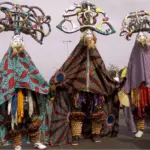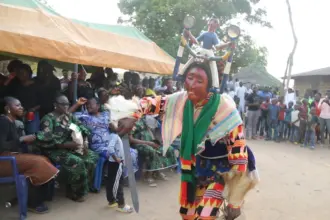
You may have heard about it from the smash hit single by famous Afrobeats artist Wizkid, or from the legendary Fela’s song that celebrated the hustle of bustle of Ojuegba. In cities like Abuja, Ojuelegba has become synonymous with vibrant restaurants serving amala. But what you might not know is that Ojuelegba is more than what you have heard in popular culture.
Ojuelegba is a crucial connection point for travelers within the mainland, connecting the surrounding districts of Surulere, Yaba, and Mushin.
Ojuelegba, a suburb in Surulere Local Government Area of Lagos State, was a forest and the consecrated site for the worship of Shù Elegbua. Shù Elegbua is also known as Légba among the Fon people of the Benin Republic, Exu in Brazil, Echu-Elegua in Cuba, Papa Legba in Haiti, and to some African-Americans as Papa La Bas. This was long before urbanisation and the British bombardment of Lagos in 1851.
According to Yoruba Blog, the Aworis, who are said to have been the first people to live in this area, used to worship Láàlu Ogiri Òkò, the deity in charge of order and the divine enforcer of natural and divine laws, right under the current Ojuelegba bridge. The shrine was moved several times before it was finally settled at its current location, a few steps (to the south) away from the current Ojuelegba roundabout. It was made of lateritic earth and had cowrie shells marking the eyes and mouth of Eshu, where worshipers pour daily offerings to please the god. It bears the inscription “Oj-Ìbo Elégba,” which is the origin of the town’s name, which means “Eyes of Elegba” or “the Shrine of Elegba.”
A Jeremy Weate and Bibi Bakare Yusuf study titled “Ojuelegba: The Sacred Profanities of a West African Crossroad,” write: “Prior to urbanisation, Ojuelegba had the ‘stone’ of atonement, made of lateritic earth with cowrie shells marking the eyes and mouth of Esu in which cult officials pour daily offerings of palm oil to maintain’s Esu’s problematic coolness. With increasing congestion at Ojuelegba, Elegba cult officials decided to move the shrine to its current site on Apapa road, where the worship of Esu continues to this day in relative peace, and the descendants of the Awori fishermen remain at their trade. Till the present time, each Sunday, devotees of Elegba (no longer purely Aworis) congregate to worship the god of threshold.”

Ojuelegba became famous in the 1970s for its lively nightlife. This was partly due to the fact that Fela’s shrine was first located there. It was also due to the fact that it is a crucial connection point for travelers within the mainland, connecting the surrounding districts of Surulere, Yaba, and Mushin. It also serves as the connection between the ever-busy Apapa-Wharf shipping yard and the Ikorodu and Agege motor road. Urbanisation has thrown the seven Obeles or major communities that constituted the old Ojuelegba into extinction.
In 1975, Fela wrote a song called “Confusion” about it:
“For Ojuelegba, for Ojuelagba
Moto dey come from south
Moto dey come from north
Moto dey come east
Moto dey come from West
And policeman no dey for center
Na confusion be dat oo
Na confusion be dat oo”.
There were regular tanker and other vehicular accidents on the Ojuelegba bridge, daylight robberies characterised the place, with prostitution and indiscriminate drug abuse. People associate the town with evil in all ramifications.
“Apart from the Elegba shrine, which was demolished as a result of the construction of the bridge, the town’s main Iledi at Masha has also paved the way for a modern drainage system. Edan and other deities, which were kept in the Iledi were also abandoned.”
But Oluwo Olanrewaju Ajala Ajamajebi, the Olori Oluwo Ogboni Abalaye Fraternity Association of Nigeria, a custodian of the culture and tradition of the indigenes of Ojuelegba, holds a contrary view. Oluwo Abalaiye, popularly known as Oluwo Taju, while speaking to Saturday Tribune, said Elegba in Ojuelegba “brings peace and tranquillity to the Lagos community.”

Nonetheless, it took a government-sanctioned ceremony of appeasement of the spirits for many freak auto accidents to stop becoming a regular feature of Ojuelegba.
Saturday Tribune reported further: “Apart from the Elegba shrine, which was demolished as a result of the construction of the bridge, the town’s main Iledi at Masha has also paved the way for a modern drainage system. Edan and other deities, which were kept in the Iledi were also abandoned.” This was the more reason an appeasement of the neglected spirits was desired.
English dictionaries associate Èṣù with evil. In fact, online, its definition associates it with “Trickery, Crossroads, Misfortune, Chaos, Death, Travelers, Messenger”. In one entry on Encyclopedia.com, the Èṣù is said to know “all the languages spoken on earth, serves as a messenger between the gods and people. He also carries up to heaven the sacrifices that people offer to the gods.” The encyclopaedia noted an interesting dimension: “According to one story, Eshu became the messenger after playing a trick on the High God.”
The trickster image of a god carrying messages between this world and the celestial sphere in Yoruba divinity is corroborated in Jeremy Weate and Bibi Bakare Yusuf’s study. They found that “Esu is the orisha of the mixed message, distant cousin (across the ocean) to Hermes, the Greek god of garbled meaning, potentiality, plurality, and paradox. Sometimes he takes the form of a creature wielding a large stick. At other times, he is a tiny being that needs to ‘tiptoe to put salt in the soup’. At all times, he embodies exchange and paradox: he is both the first born and the last born; at once an old man and a child, and both cunning and capricious. At times, Esu appears as an aggressive copular god. Elsewhere, he becomes a beautiful woman, or a bisexual figure… he is a thief, a trickster and a transformer: turning nonsense into sense and back again.”
This image of evil associated with Ojuelegba owing to a link with Eshu may therefore be misplaced.
Follow the AkweyaTV channel on WhatsApp: https://whatsapp.com/channel/0029Va7m7dvJuyA7h5XMc22i















